December Newsletter
Volume 2, Issue 12
December 1, 2021
Special Points of interest

State Director of Referee Development
Welcome to the December issue of the MRC newsletter. How was your fall season? Some of you may still have a few games left. I also heard that some will be traveling south to work at various tournaments during the offseason. But for many others, this may be an off season you have waited for a while. With the referee shortage, many of you worked so many games in the last few months. I am sure all the players appreciate your work. Take good care of yourself so you will be ready for the next season.
We are in the middle of recertification. While we continue to offer a few brand-new referee certification classes every month, we have three to five recertification classes taught every week. As you will see below, we are offering three different options for grassroots recertification. You can pick one of the three that best fit the kind of games you are officiating. Please take a look at the “Time to Recertify” article for more details.
In November, we also had our regional referee recertification and emeritus regional referee recertification. At the regional recertification class, eight new regional referees received their regional badge for the first time. Please join us in congratulating them for their accomplishment. It is, however, important to remember that nothing is guaranteed. They will all have to pass the fitness test and two maintenance assessments to keep their badge in 2023.
As always, our November newsletter is full of exciting stories and information. We are featuring Josh Pederson and Chad Szymczak for “Referee of the Month” and “Who’s Who.” We also hear about some referee training from the Lansing area, as well as out-of-state work with Nichole Kramer-Kiuchi. You will also have a chance to know a little more about the new regional referees. We will end the newsletter with an announcement by OSI.
Beyond this newsletter, please be sure to follow our Twitter (@MichiganReferee), check out our blog, and subscribe to our YouTube Channel.
Inside this issue
- Time to Recertify
- Referee of the Month: Josh Pederson
- What Do They Do?
- When You Officiate a Youth Game
- Referee Training in Lansing
- Say Hello to Brooke!
- Meet Our New Regional Referees
- Next Mentor Development Group Members
- Being a Regional Referee
- Mentoring at a National League Event
- Updated List of DDRDs
- Interview with Carlos Folino
- What is Your Call?
- Who’s Who: Chad Szymczak
- OSI Annual Holiday Sale
Time to Recertify
It is that time of the year! If you are a grassroots referee who has a badge that says 2021, you need to recertify. In other words, unless you took a brand-new referee course after July 1, 2021, all of you have to recertify to remain active in 2022.
Please access this page to choose the right class for you to take.
For the first time, we are offering three different options for grassroots recertification. Previously, we only offered one kind of recertification. As a result, a grassroots referee who regularly officiate one of the highest-level games in the state and a grassroots referee who usually officiate a small-sided games were in the same classroom. It did not create a very productive learning environment. This year, we have three groups. Group A recertification classes are for those who primarily work on small-sided games and/or recreational games such as MYSL, CASL, and GVSA. Group B is for those who primarily referee state-level games such as MSPSP and State Cup, as well as local recreational adult games including Blossom League, AAPL, MUSL, and MMMSL. Group C classes are for those who referee primarily regional and national games including MWPL, UPSL, MPSL, and USL2.
The course content varies from a group to another. So it is important that you choose the right class to maximize the value of your learning. The link shared above will help you guide to the right page.
On January 1, 2022, grassroots licenses will become inactive unless you have recertified by then. Therefore, we recommend that you recertify before December 31, 2021. Or, if your schedule does not allow to do so, we ask that you recertify before your first match in 2022. GameOfficials already has a lot of recertification classes listed so you can pick one based on your group and availability.
If you have any questions about your recertification process, please reach out to one of the MRC members. Their contact information appears at the end of this newsletter.
Referee of the Month: Josh Pederson
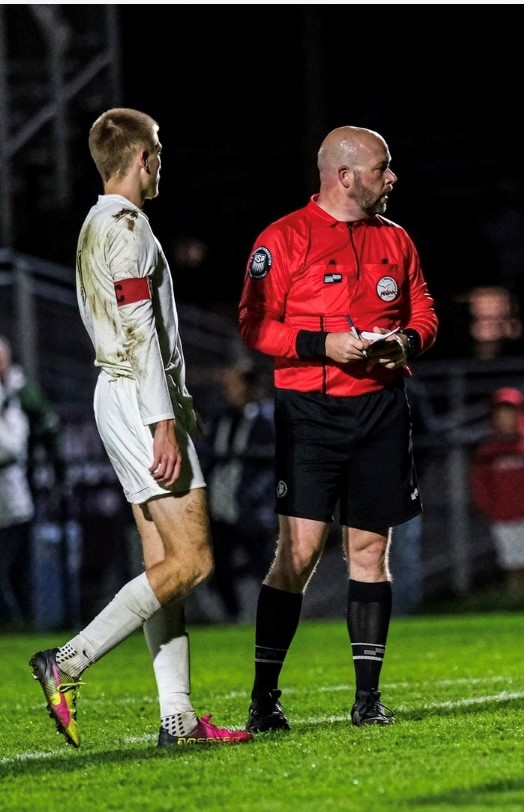
Grassroots Referee
About 7 years ago, I was at a point in my life where I could merge my passion for soccer with my love for officiating. So, after 20 years of doing basketball, I added soccer to the list of sports that I officiated. I really enjoyed getting out on the field and testing my skills in a new venue. I received much help, support, and mentorship from so many people in the area. While there are too many to list here, I would like to thank several people who are especially important to me: John Douglas, Dean Kimmith, Roger Blasey, Dena Conine, and Jeremy Wittrock. Each of them contributed to different areas of my skill set and spent extra time with me to give me the opportunities I have.
Merging the officiating skills I learned in basketball and soccer, I decided to try my hand at futsal. I was able to take that opportunity and take the next steps in my officiating career. I have had the privilege to be able to officiate at the futsal youth nationals and am an official in the National Futsal Premier League (a semi-professional futsal league in the U.S.). Again, I have had several mentors. In Michigan, I have learned a great deal from Brett Wilner and Steve Seward. There are also officials from around the U.S. that have been great mentors to me in futsal.
My advice for officials is to find people to mentor you. Mentoring does not need to be done only through the official mentorship programs (although these are great programs to help you advance your skills). Find people who are officiating at a level you want to be at. Ask them questions. Ask them to watch your games and provide feedback. When you receive feedback from any mentor, official or unofficial, understand that they are trying to make you better. Take what they tell you, apply what you can to your game, and repeat that process. Once you achieve your original goal, you might be surprised at where else this career can take you. Keep looking for those other officials who are where you want to be, and you can reach whatever goal you set for yourself.
What Do They Do?
We all have a lot of friends though refereeing. But do you know what they do? Do you know in what industry they work?
What about the MRC members? All MRC members are volunteers so they have a day job. Do you know what they do? Let’s try a fun survey below and see what you think each MRC members do. Tell us how much you know about them! Maybe someone’s job will surprise you.
Take an anonymous survey here.
When You Officiate a Youth Game
When you officiate a U-10 game, do you officiate differently from officiating a U-18 game or an adult game? If so, why? The Laws of the Game is the same regardless of the age of players, with only a few exceptions such as the field size. But we all know that our approach to a game would be different if we are on a youth game.
One of the major reasons behind our different approaches comes from player safety. We tend to be more careful about player safety on a youth game. For example, we are more likely to stop a game for a suspected injury on a youth game than on an adult game. Although one could argue that we should be equally caring when an adult is injured, we know that we are extra cautions with young players.
Think of an offside situation. A player is in an offside position with another attacker in an onside position. They both chase the ball. In the meantime, the goalkeeper is coming out of the penalty area to clear the ball. You suspect that if the play continued, the offside player and the goalkeeper might collide. But you also know there is an onside player. What do you do?
Many of you may say that if it is an adult game, you would apply the wait-and-see approach to see which attacking player plays the ball. If it is the player in an offside position, you would raise your flag. If it is the player in an onside position, you would keep your flag down. What if it is a youth game? Do you raise your flag to be on the safe side, even if you know that an onside player might get the ball and even score? What if it was a tie game with two minutes left? What if it was a junior state cup semi-final?
If an assistant referee raises their flag prematurely or the referee blows their whistle prematurely, in the scenarios above with youth games, there may be two reasons why a premature decision is made. The first is when an official is fully aware that there is an onside player who would go for the ball and an offside player. For the sake of safety, they decided to call offside. The second is the officials just saw the offside player and called offside either not seeing the onside player or not knowing the implication of calling offside.
The first instance is what is often characterized as “technically wrong but practically correct.” It is technically wrong not to apply the wait-and-see approach in this instance. But for the sake of safety, you might decide to be “wrong” on purpose. This means that when a similar situation happened without the risk of collision, the referee crew would make the right decision. However, things are different in the second scenario. If a similar situation happened without the risk of collision, the referee crew in the second scenario would still call offside, leading to a technically and practically wrong decision.
This is why it is vital that we know what is technically correct first. After that, we may deviate from it. But if we do not know what is technically correct, we will end up making a mistake on our next game.
Referee Training in Lansing
With the leadership of Andrew Hoard, the President of the Great Lansing Area Soccer Referee Association (GLASRA), three referee training sessions took place recently. Two of the sessions were field training sessions. Over 10 referees attended each session with a few MRC mentors present. The other session was a zoom session where Andrew, along with a few other mentors, discussed two video clips about offside and challenges.
Now that most of us are in the off season from officiating, this is a great time to improve our skills for next year. Talk to your District Directors of Referee Development and ask about training opportunities.
Say Hello to Brooke!
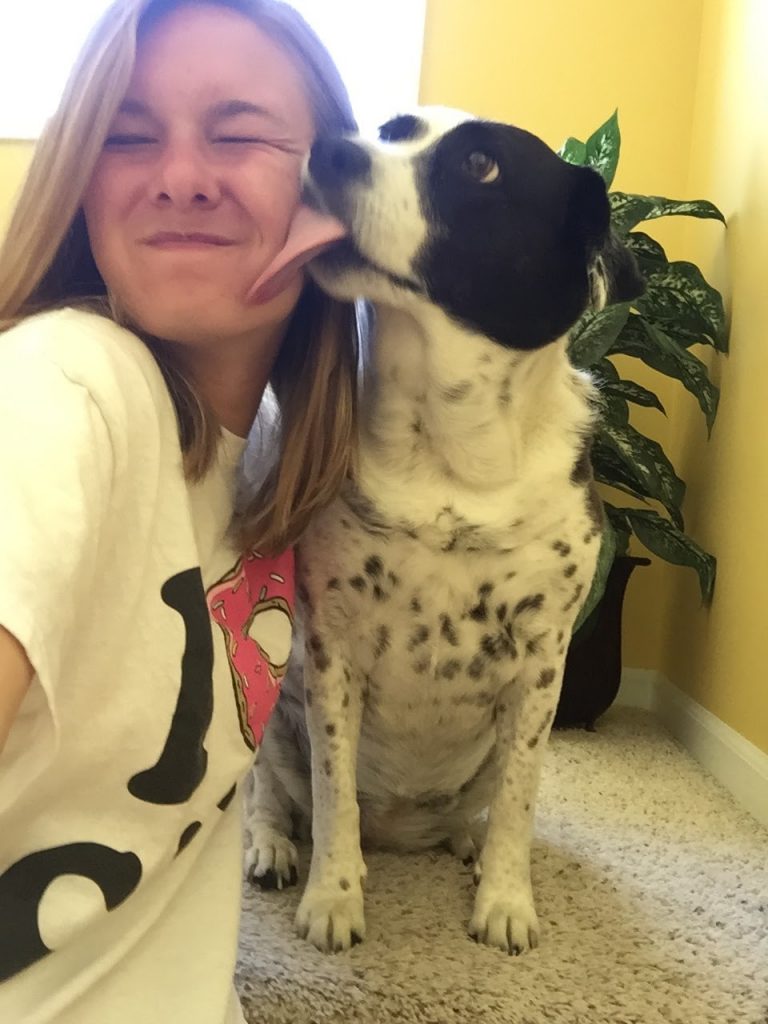
Meghan and Brooke Brasseur
What is your name? How old are you? And what breed are you?
I am Brooke. 14 years young (15 on January 4th!!!) I am a mutt – mix of beagle and terrier.
How long have you known Meghan? How did you meet her?
I have known Meghan for 13 years. We met when my dad brought me home from my foster family’s house to my fur-ever home.

Do you ever go watch her referee?
Yes! I especially like to watch the games under the lights.
What do you do while Meghan is reffing if you don’t go along?
I sleep, demand dinner, and protect the house from the evil UPS trucks.
Do you help her pack her ref bag?
No, because that means Meghan leaves. I lay on it instead to stop her. It hasn’t worked yet.
Do you ever help Meghan train for reffing?
Not anymore because that requires running and my old legs can’t handle that. I supervise instead.

Have you ever chewed up any ref gear of hers?
I have not chewed any ref gear!
Can you do a trick? If so, what can you do?
I can sit and shake.
What is your favorite toy?
My favorite toys are my red rope toy and my brown plastic chew bone!
What is your favorite treat?
My favorite treat is whatever food my humans are holding (except vegetables. gross)
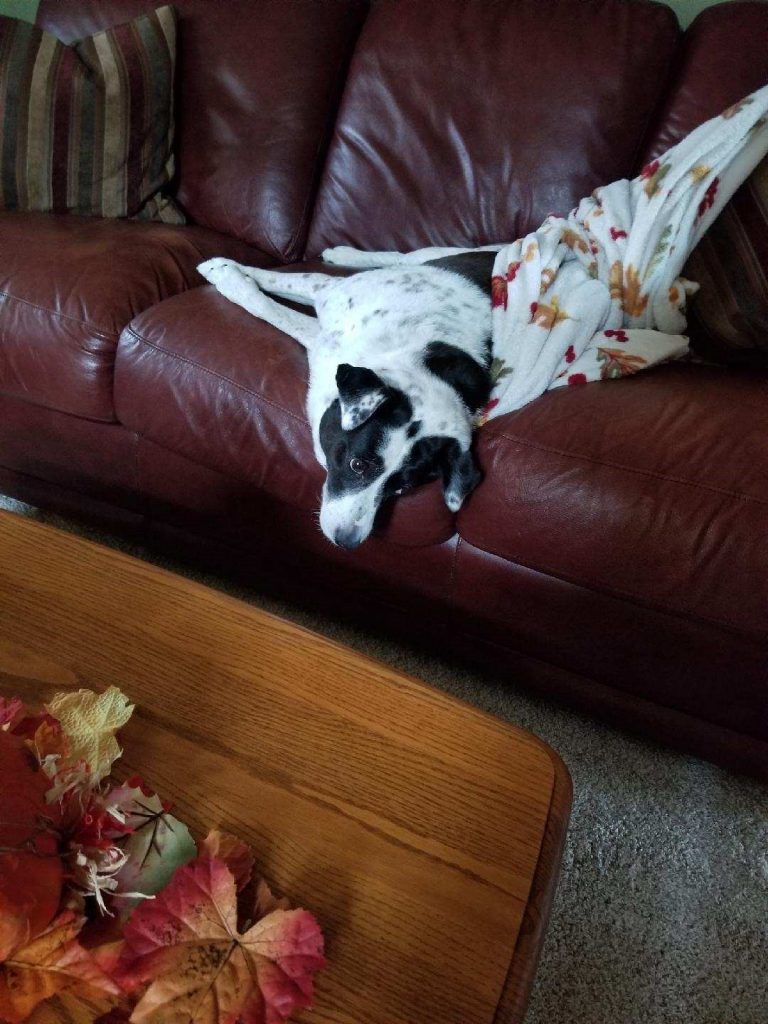
What is your favorite game to play with Meghan?
My favorite game is hide-n-seek. When I can’t find Meghan, I open all the doors in the house until I see her!
What do you enjoy about Meghan being a referee?
The best part of Meghan being a referee is I get all the walks I want at the soccer complex!
What don’t you enjoy about Meghan being a referee?
The worst part is she leaves me 🙁
What is something unique that you do?
My unique trait is I’m a referee, too! When we are having a big party with my cousins, I step in and break up any playing that gets too fiesty. I’m the oldest and take my job of protecting the new pups very seriously.
What do you like to do when Meghan is not reffing?
I like to cuddle in front of a fire when Meghan is home 🙂
Meet Our New Regional Referees
We are happy to announce that we will have eight new regional referees this year. They have all met the administrative requirements and applied for an upgrade about a year ago. They have since then passed a FIFA fitness test and three upgrade assessments. This month, we will feature two of our new regional referees: Eric Budd and Mark Lorkowski.
Meet Our New Regional Referees
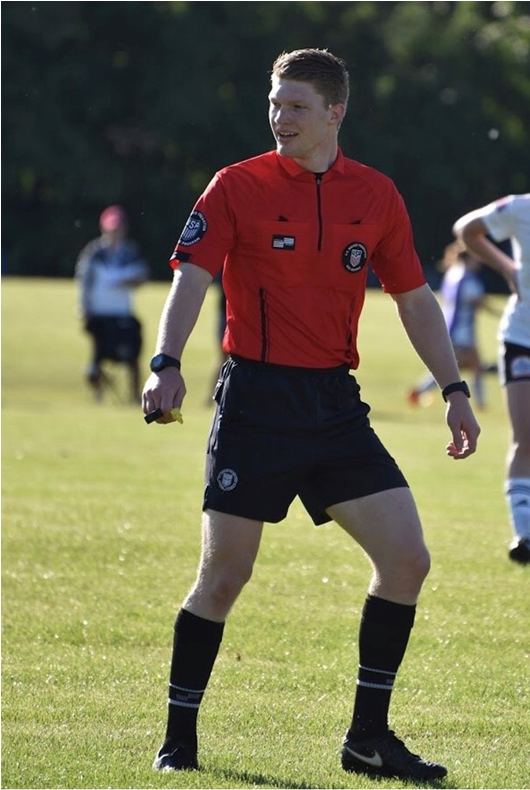
Eric Budd
“Upgrading to a regional official has been a goal of mine ever since I started refereeing as a grade 9 referee in 2013. After spending countless hours at the field, learning from and working with experienced referees across state, and working higher level matches, I believe that I am prepared for the assignments and challenges that comes with being a regional official. I am excited to continue to develop as a referee, strive to reach my personal goals, and become a mentor to younger officials across the state. The greatest piece of advice learned came from watching the models of professionalism older officials such as Kevin Winningham and Josh Abts have set forth. Through my development as a young official, I was able to work countless matches with these two gentlemen. Both on and off the pitch, they conduct themselves with honesty and integrity in the way they officiate the game and in their relationships that they have cultivated with coaches, players, and fellow referees/assignors/mentors. Maintaining professionalism by operating with honesty and integrity both on and off the pitch is the greatest piece of advice that I could pass onto younger officials.”
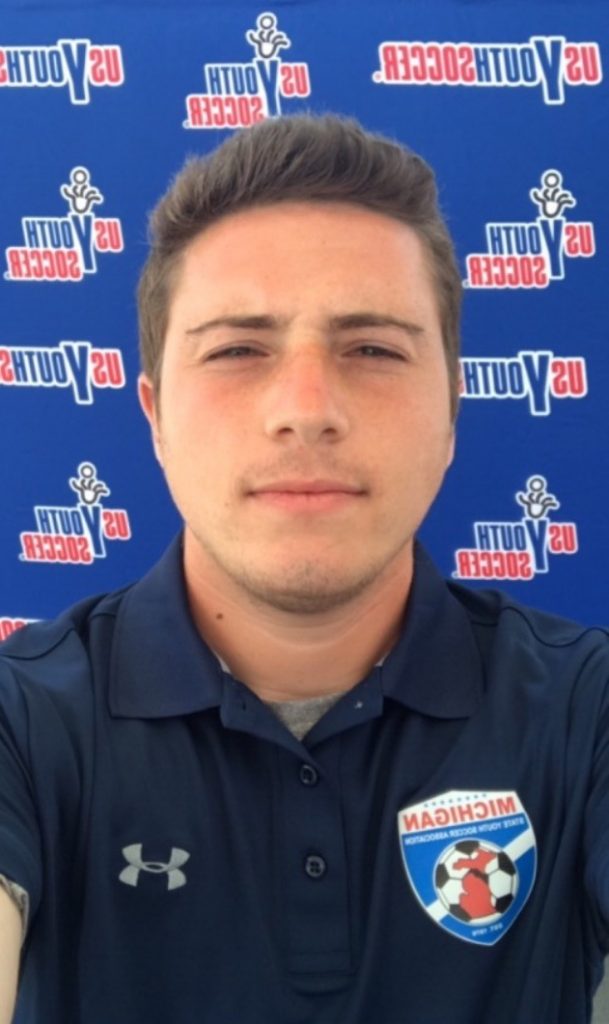
Mark Lorkowski
“My refereeing career started back in 2007 at the age of 12. I was playing soccer for Carpathia Kickers and had got word that they were looking for referees to officiate matches. I, just like everyone else thought it was an excellent way to make some cash at a young age. I am 26 now so I will be going on my 15th year as an official. The upgrading process was a great experience for me as an official.
“I learned a lot about myself, the game and what it will take to get to the next level. The first thing is meeting the game requirements which allows you to apply for an upgrade. Once you receive the candidacy you must the pass the fitness test which I took back in the spring before getting the opportunity to be evaluated on matches. If you fail the fitness test, you are no longer an upgrade candidate. Next is getting evaluated on three matches: two at the adult armature and one can be any adult game or highest-level youth. Receiving a passing score on all three matches allows you to take the law test, safesport trainings, and attend required training sessions. The regional badge really sets the bar for how serious of an official you want to become. I really enjoy all parts about refereeing. Doing competitive matches always tops my list. Meeting new people/friends who share the same passion through state, regional and national events. Gaining a bunch of new friends (or should I say family) throughout our Michigan delegation. Traveling to different venues across our country to officiate. Lastly refereeing has allowed me to be a part of the game I love at some of the highest levels out there.
“I think as an official it is important to set a big goal with a lot of small goals in between. I think everyone wants to be a professional and that is only realistic for a few. This should be a big goal for everyone as it will make you a better official and give you something to strive for. I want to always be challenged as an official, where that takes me is a very good question. I feel that is what makes the game fun. Achieving my regional badge was something I have been wanting to do the last few years now and is awesome to see one of my big but small goal come true!
“Some advice I would give to upcoming referees is always have fun. This is one of the main reasons why you chose to be a referee or even start playing soccer in the first place. I feel many people lose sight of this in today’s world. You might not have every game goes as you plan but that is part of the game. We have to expect the unexpected as a referee. People from all over the world play this sport for the same reasons you and I do. We should be always trying to make the game better than we found it. That is why it is called “The Beautiful Game.”
Next Mentor Development Group Members
As was noted in the November newsletter, we had six people successfully complete their mentor development program this fall (Dean Kimmith, Brad Heers, Kerry Martenis, Jake Brochu, Steve McGuirk, and Larry Olsen). They are currently undergoing their licensing process with U.S. Soccer. In the meantime, we have a new group of mentor development program participants. They will go through training over winter so that they can be licensed by U.S. Soccer before the start of the 2022 spring season.
The new members of the development program are Meghan Brasseur, Tom Corsentino, Ashley Fromson, Leighton Kelly, Nick Raith, Rob Ruta, Pete Loria, Scott Manteuffel, Jim Dyer, and Jared Wilson-Santos.
These participants will complete the training by the end of February. Upon their successful completion of the program, they will participate in the U.S. Soccer licensing process in March.
Being a Regional Referee
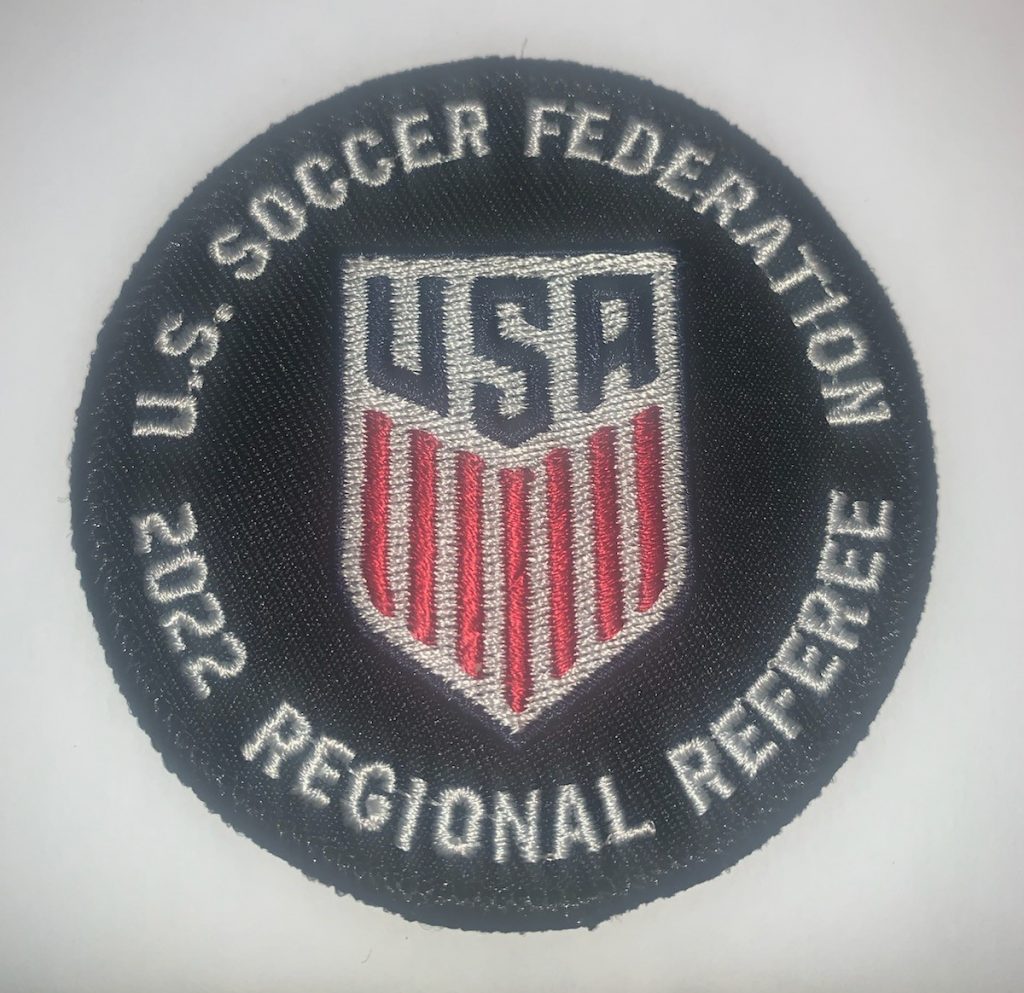
On November 20, the MRC hosted its regional referee recertification class via zoom. We have over 3000 referees in the state but we only have about 30 regional referees. This is to say that these regional referees are very elite referees in Michigan. What does it mean to hold the regional referee badge?
Many referees work hard at gaining the badge. You will not become a regional referee just because you have been officiating 10 years or 20 years. There is a set of requirements that everyone has to meet. But this also means that just because you are a regional referee one year does not mean you will be a regional referee next year. A referee license is not like a high school diploma or a college diploma, where once you get a degree, you will always have the degree. But a referee license is different.
If you see a referee with a regional referee badge, it means that they passed (not just taken!) the required fitness test and passed two or three assessments. Existing regional referees have to pass two assessments while upgrading referees must pass three. But the expectations are the same. Just because someone is a current regional referee does not mean that the standard for recertifying is lowered.
This means some referees may lose their regional referee badge. It may be because of an injury or an illness. It may be because their work or school got too busy. Or they may find a new passion in life. Some will simply retire from competitive games and decide to work locally. But if they decide to have their regional referee status reinstated, they just need to pass the fitness test and assessments.
So if you see a referee with a 2022 regional referee badge, congratulate them on their accomplishment in 2021. If you lost the badge for 2022 for whatever the reason, you can try to have it reinstated in 2023 by passing all the requirements, just like those with a 2022 regional badge would have to do to keep their badge in 2023. If you have not had a regional badge yet but want one, keep working hard. Talk to your local mentor and ask for input.
Mentoring at a National League Event
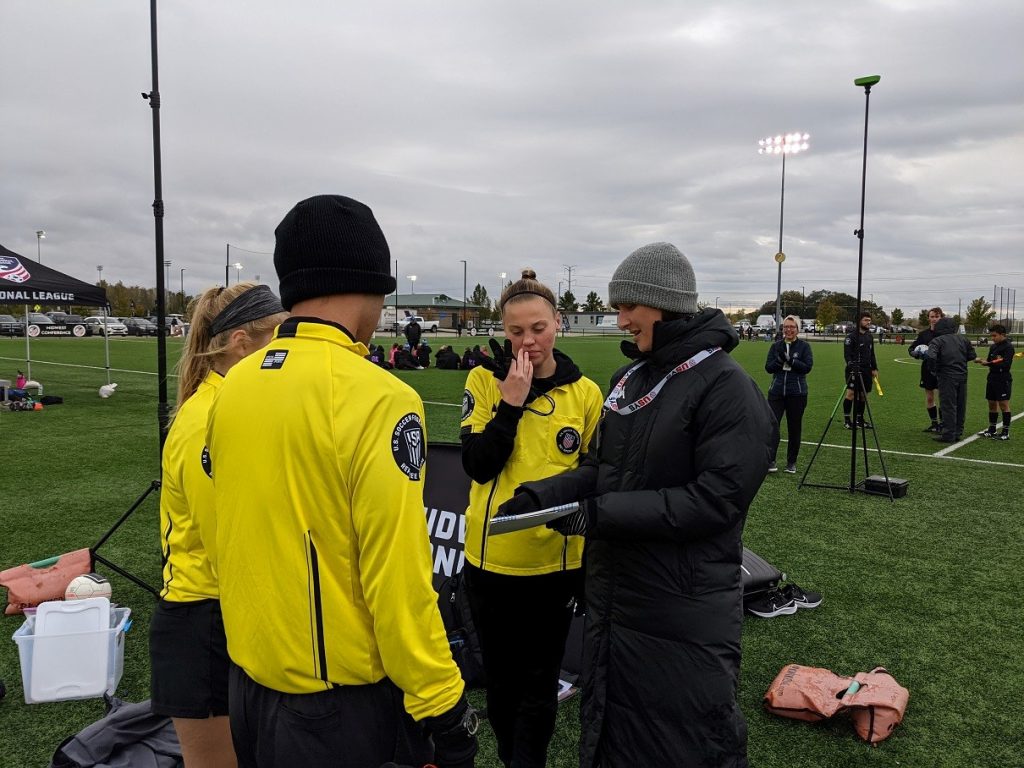
Just like referees are oftentimes invited to an out-of-state event to officiate matches, our referee mentors and coaches are also invited to help develop referees within the region or even across the country. During the National League Event in St. Louis, MO, from October 29 to 31, Nichole Kramer-Kiuchi was one of the referee coaches to be invited to attend the event to help the referee academy. The academy consisted of over 15 referees from various states in the Midwest region, including Indiana, Ohio, Missouri, to name a few. Nichole observed games over three days and provided feedback to the officials.
Updated List of DDRDs
We have a few changes with the list of District Directors of Referee Development (DDRDs). They are in charge of scheduling in-person recertification classes, hosting field training sessions, etc. They also ask mentors to come to tournaments in their districts to offer various training opportunities. Please reach out to them if you are looking for a mentoring opportunity in your area.
Metro West: Jeff Dornseifer
Metro East: Brandon Barlog and Alex Plum
Flint/Saginaw/Midland: Brad Barlog and Stan Krajkowski
North: Bruce Falberg and Kevin Avery
Lansing/Jackson: Andrew Hoard
Kalamazoo: Jim DeBrabander and Bill Wilkinson
Grand Rapids: Kristy Bos
South West: Simon Blackwell and Luis Aguirre-Rivera
Interview with Carlos Folino
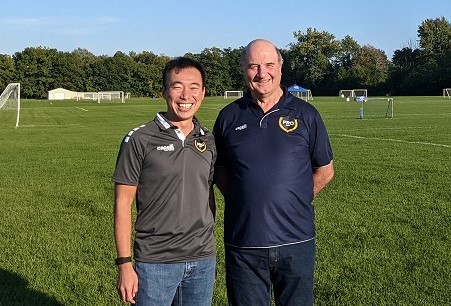
There are about 100 U.S. Soccer National Referee Coaches in the U.S., and Michigan has 3 of them. There are about 30 PRO assessors and Michigan has 2 of them. For this month’s newsletter, we interviewed Carlos Folino, who is not only our SRA but also a National Referee Coach and a PRO assessor. Carlos assesses NWSL games and during his first year as a PRO assessor, he was entrusted with 15 games. Please check out the link here to listen to his experience as a PRO assessor.
What is Your Call?
In the November newsletter, you were given a clip that showed a possible handball offence. The survey asked you to identify what action would have to be taken.
The November video was this.
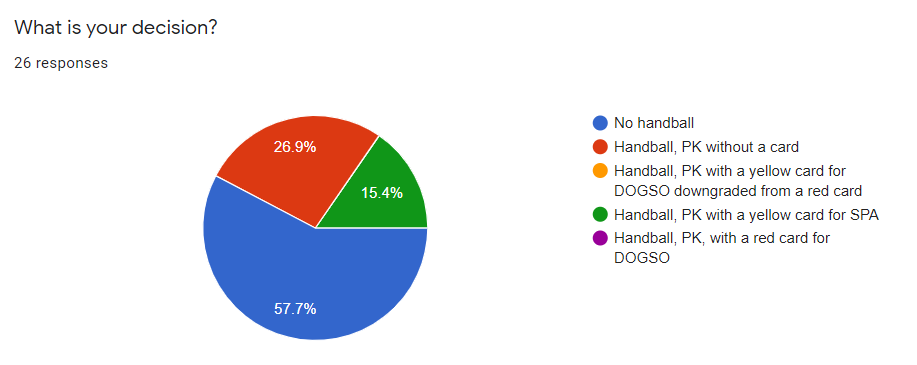
About 60% of you had no foul and 40% of you had a foul.
The ball clearly hits the left upper arm of the navy defender.
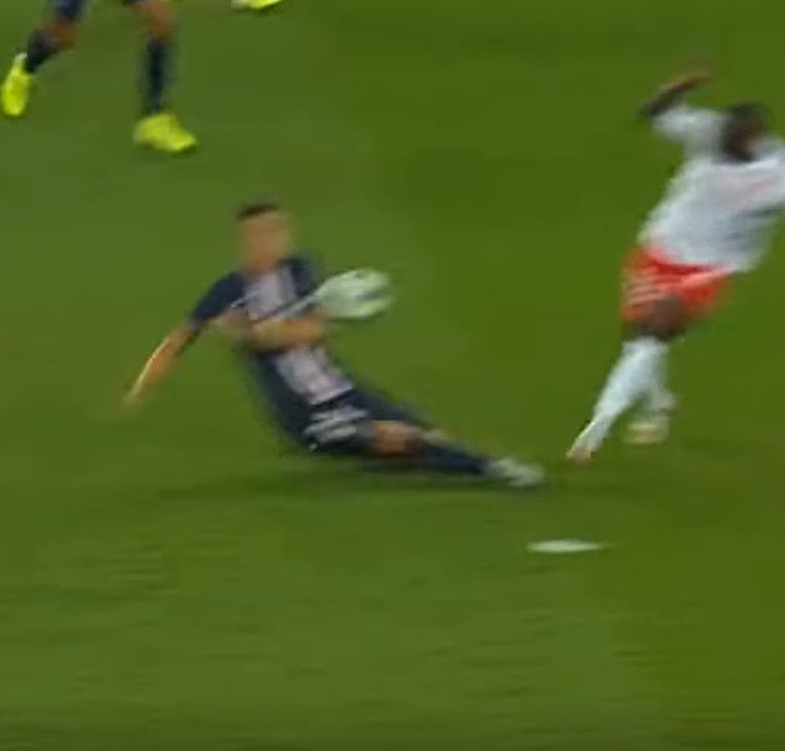
When we consider handball, we have to think almost like a flow chart. The first question is what kind of handball offence this might be. Because this possible offence is by a defender, we do not have to worry about so-called attacking handball. In that case, we have two possible handball offence types: deliberate handball and handball by making oneself unnaturally bigger. Deliberate handball is what many call “hand to ball” rather than “ball to hand.” In this video, the defender’s arm did not move toward the ball or the path of the ball. So this cannot be deliberate handball.
Now the only possibility is a handball offence by making oneself unnaturally bigger. When you look at the picture above, do you think the left upper arm is within the width of the body? Or is it making the defender’s body wider? Additionally, is the upper left arm extended away from the body in a way that you do not expect?
This defender’s left arm is not making himself unnaturally bigger. It is not extended out. It is in an expected position. The defender’s move in general is an expected defensive move. The left arm is in a justifiable position in relation to the justifiable and expected movement by the defender. Therefore, we do not have a handball offence in this situation. The correct answer is “no handball” as almost 60% of you answered.
Now, for the sake of learning, let’s say that the defender’s arm was extended out and he is guilty of handball. Would you give a caution? Some of you (15.4%) think so while almost 27% of you do not. If, as the referee, you consider the shot by the white player to be on target, a yellow card has to be given for stopping a promising attack (SPA). If you consider the shot to be off target, a yellow card will not be given.
This month, we will continue to talk about a possible handball. Assume that the shot is on target. But is this handball? Do we need a card? Please watch the video and decide what your decision might be. You can find the video here.
You can submit your answer here.
Who’s Who in Michigan: Chad Szymczak
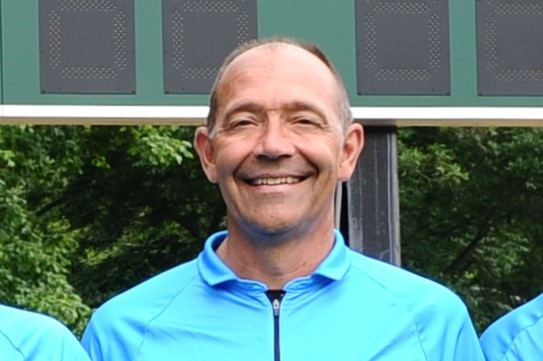
Referee Mentor
My introduction into soccer was because of my daughters wanting to play. I didn’t play soccer growing up, I was a baseball & basketball guy. So we signed the kids up to play AYSO beginning in 1995. When my second daughter signed up 2 years later, there wasn’t a coach for her team so I volunteered. I always enjoyed watching soccer and I understood most of the rules, so I dove in. Once we started organizing our team, I realized we needed to, as coaches, referee the match as well as coach. I had been a basketball referee & a baseball umpire since 1981, so it wasn’t much of a stretch to get on the pitch. I went and picked up a book on soccer to become more familiar with all of the rules.
A couple of years went by and my kids began playing for the Red Arrow Soccer Club. I kept coaching my youngest daughter’s team and heard that they were hurting for soccer officials at this level and High School. I decided to sign up for both. My first USSF class was taught by Gerry Ouellette and Heinz Meyer. I was immediately assigned matches by Heinz and my ref career took off from there. I became a Grade 7 two years after I started and moved up to Grade 6 in 2010. After refereeing matches with Gerry and John Nadzam early on, they encouraged me to also become a college official, which I did in 2008.
I had many referee “mentors” in my early years, along with who I’ve already mentioned, Gary Neidert, Scott Ryder, and Wayne Wilkinson were people I turned to for advice many times. I really enjoy being a part of the game and still get excited when assigned a big match. Some of my best memories from the game of soccer include, State Cup weekends, MHSAA finals, and college soccer playoff matches. Let alone several of the road trips I’ve taken with other refs over a long weekend of games.
My advice to young officials is, don’t shy away from asking experienced referees questions and to pick their brain to help you become a better official. There is a wealth of knowledge out there to be tapped & we are more than happy to help.
When I’m not on the soccer field you can find me on the basketball court in the Winter. When the weather gets warm, I’m on my road bike pedaling away, enjoying a round of golf with my wife Jen and visiting one of our many brew pubs or wineries.
OSI Annual Holiday Sale

Quantities are limited on sale items, shop early to save
Quantities are limited on sale items, shop early to save
Everyone is rushing to save on the Official U.S. Soccer Referee Uniforms & Gear!
Buy 2 or more jerseys & save. Mix Pro & Economy Styles. The Official U.S. Soccer Referee shorts & socks are also on sale! Shop Holiday Sale.
Get Ready for next season! Upgrade, refresh or start out right with all the tools of your trade: watches, flags, whistles, cards & so much more.
New USSF Apparel! Celebrate your well-deserved achievement & success with new U.S. Soccer Referee apparel: wicking tees, ¼ zips, jackets, pants & polos available here.
With over 37 years in business and dedicated solely to soccer referees, OSI has exactly what you need to set you up as the professional that you are!
Michigan Referee Committee
State Referee Administrator (SRA): Carlos Folino
State Referee Chairman (SRC): James Wheeler
State Youth Referee Administrator (SYRA): Ronald Grobbel
State Director of Referee Development (SDRD): Yuya Kiuchi
State Director of Assignors (SDoA): John Corbett
State Director of Futsal (SDF): Richard Gilbert
Manager of Performance Observation (mgr.observation): Tim Deters
Manager of Field Sessions (mgr.field): Jeff Dornseifer
Manager of Video Analysis (mgr.video): Nichole Kramer-Kiuchi
Manager of Pedagogy (mgr.pedagogy): Kalani Burghard
Email addresses are the title in parenthesis plus @michiganrefs.org
Please reach out to us!
If you have any referee-related stories to share or someone you think should be featured in this newsletter, please reach out to us at sdi@michiganrefs.org.
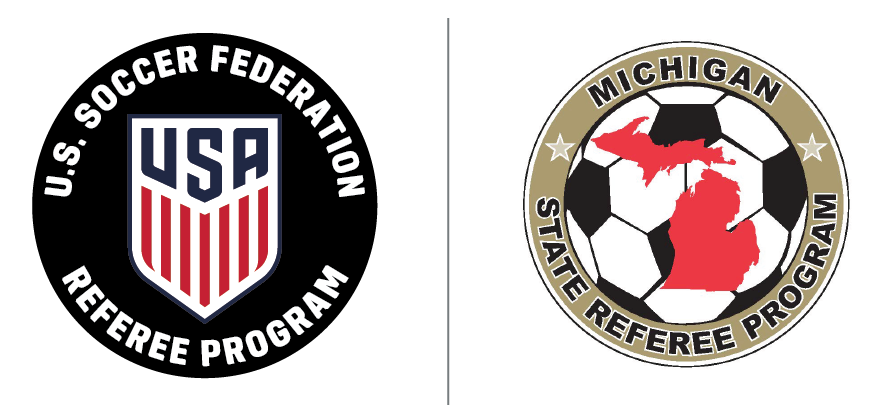
MRC announcements
If you know anyone who would like to become a referee, we offer numerous grassroots referee classes, as well. You can find relevant information here.
Contact one of us on the Michigan Referee Committee if you have any questions.


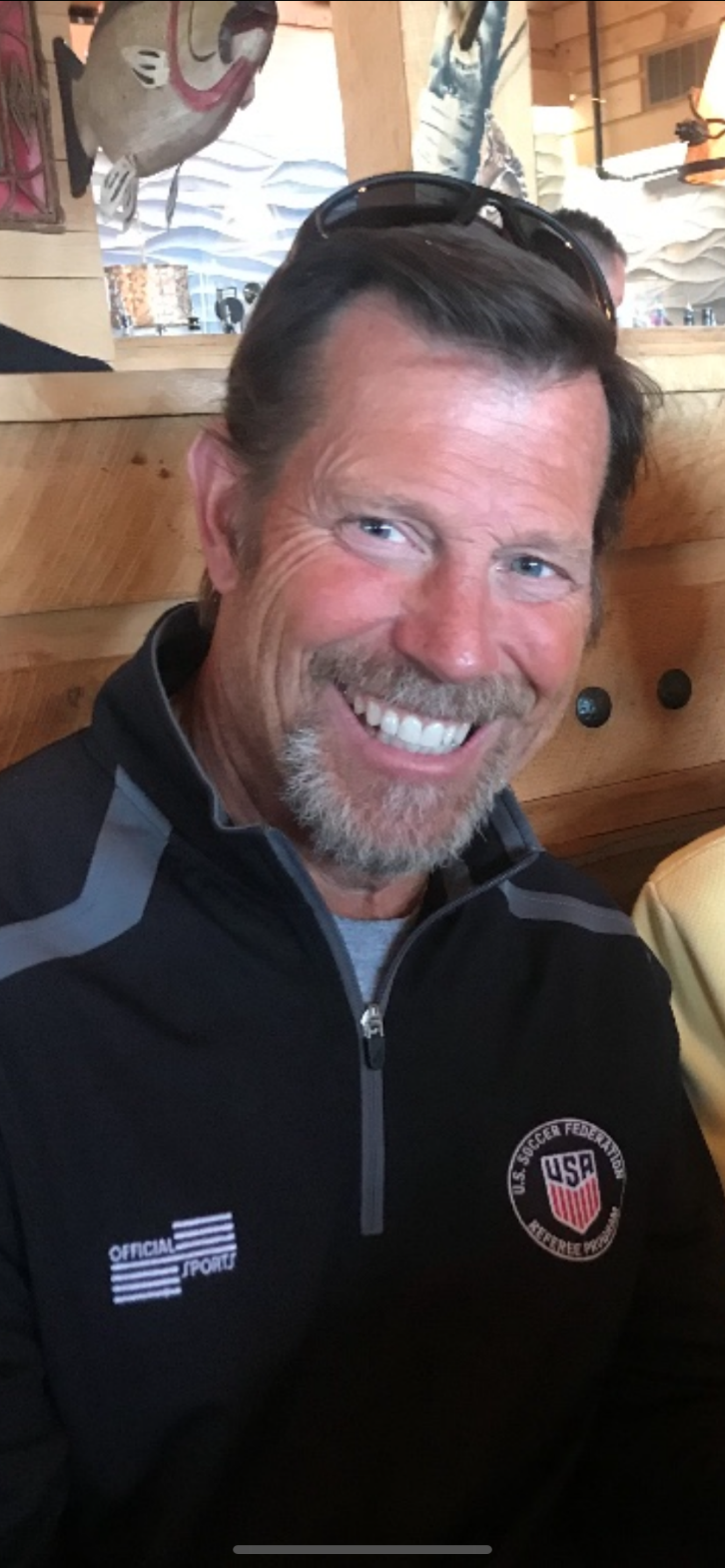
No Comments
Sorry, the comment form is closed at this time.